

Leading a sustainable and truly radical life encompasses a whole variety of things that challenge the mainstream. This book shows how we can make real changes to the way we live. In simple steps, it describes how you can create sustainable and equitable ways of living that can help transform not just your own life, but the society around you.
The book weaves together analysis, stories, experiences, and practical guides, examining nine different areas where people are transforming their lives and society---right here and now.
Accessible and informative, this DIY handbook brings alive the rich potential of grassroots activism and shows how we can work together to create just, equitable, and sustainable societies.
Covering everything from cultural activism to health, autonomous spaces, food, alternative media, popular education, and direct action, it shows you how to:
set up a housing cooperative do a workshop on climate change build a passive solar heating system start an independent media project set up a social center make interventions in the urban landscape that are funny and inspiring and lots more!
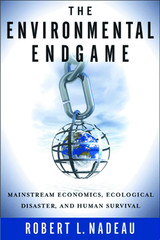
In this groundbreaking book, Robert L. Nadeau warns that we have moved menacingly close to a global environmental catastrophe and that to evade this fate we must stop drawing a distinction between issues that are "environmental" or "scientific" and those that reside in the sphere of "real life." Although scientists have attempted to bring ecological concerns to the forefront of global issues, problems are rarely communicated in ways that can be readily understood by those outside the scientific community.
Bringing together perspectives from a variety of disciplines, including economics, politics, biology, and the history of science, The Environmental Endgame articulates the concerns of scientists in a way that they become the real-life, tangible concerns of people around the world. Nadeau asserts that we have entered a new phase of human history that cannot be one of separation and division but must be one of cooperation and mutual goals.
Nadeau demonstrates that our current governmental and financial institutions, based on neoclassical economics, lack the mechanisms for implementing viable solutions to large-scale crises. Such steps cannot be taken without moving beyond the power politics of the nation-state system. The book concludes with a call to view the natural world as part of humanity, not separate from it. This unifying worldview would be a catalyst for implementing the international government organizations necessary to resolving the crisis.
The Environmental Endgame is an ambitious and timely book that will change the way we think about our economy, our government, and the environment. It should be read by everyone who cares about the pervasive neglect and abuse of planet Earth and wants to know what can be done about it.
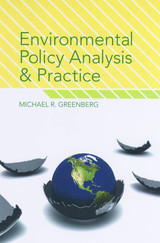
In Environmental Policy Analysis and Practice, Michael R. Greenberg cuts through the complicated layers of bureaucracy, science, and the public interest to show how all policy considerations can be broken down according to six specific factors: 1) the reaction of elected government officials, 2) the reactions of the public and special interests, 3) knowledge developed by scientists and engineers, 4) economics, 5) ethical imperatives, and 6) time pressure to make a decision.
The book is organized into two parts, with the first part defining and illustrating each one of these criteria. Greenberg draws on examples such as nuclear power, pesticides, brownfield redevelopment, gasoline additives, and environmental cancer, but focuses on how these subjects can be analyzed rather than exclusively on the issues themselves. Part two goes on to describe a set of over twenty tools that are used widely in policy analysis, including risk assessment, environmental impact analysis, public opinion surveys, cost-benefit analysis, and others. These tools are described and then illustrated with examples from part one.
Weaving together an impressive combination of practical advice and engaging first person accounts from government officials, administrators, and leaders in the fields of public health and medicine, this clearly written volume is poised to become a leading text in environmental policy.
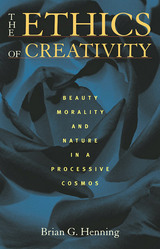
A central concern of nearly every environmental ethic is its desire to extend the scope of direct moral concern beyond human beings to plants, nonhuman animals, and the systems of which they are a part. Although nearly all environmental philosophies have long since rejected modernity’s conception of individuals as isolated and independent substances, few have replaced this worldview with an alternative that is adequate to the organic, processive world in which we find ourselves. In this context, Brian G. Henning argues that the often overlooked work of Alfred North Whitehead has the potential to make a significant contribution to environmental ethics. Additionally inspired by classical American philosophers such as William James, John Dewey and Charles Sanders Pierce and environmental philosophers such as Aldo Leopold, Peter Singer, Albert Schweitzer, and Arne Naess, Henning develops an ethical theory of which the seminal insight is called “The Ethics of Creativity.”
By systematically examining and developing a conception of individuality that is equally at home with the microscopic world of subatomic events and the macroscopic world of ecosystems, The Ethics of Creativity correctly emphasizes the well-being of wholes, while not losing sight of the importance of the unique centers of value that constitute these wholes. In this way, The Ethics of Creativity has the potential to be a unique voice in contemporary moral philosophy.
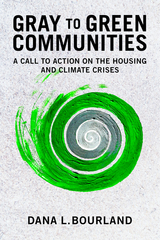
In Gray to Green Communities, green affordable housing expert Dana Bourland argues that we need to move away from a gray housing model to a green model, which considers the health and well-being of residents, their communities, and the planet. She demonstrates that we do not have to choose between protecting our planet and providing housing affordable to all.
Bourland draws from her experience leading the Green Communities Program at Enterprise Community Partners, a national community development intermediary. Her work resulted in the first standard for green affordable housing which was designed to deliver measurable health, economic, and environmental benefits.
The book opens with the potential of green affordable housing, followed by the problems that it is helping to solve, challenges in the approach that need to be overcome, and recommendations for the future of green affordable housing. Gray to Green Communities brings together the stories of those who benefit from living in green affordable housing and examples of Green Communities’ developments from across the country. Bourland posits that over the next decade we can deliver on the human right to housing while reaching a level of carbon emissions reductions agreed upon by scientists and demanded by youth.
Gray to Green Communities will empower and inspire anyone interested in the future of housing and our planet.

By the Cold War's end, U.S. military bases harbored nearly 20,000 toxic waste sites. All told, cleaning the approximately 27 million acres is projected to cost hundreds of billions of dollars. And yet while progress has been made, efforts to integrate environmental and national security concerns into the military's operations have proven a daunting and intrigue-filled task that has fallen short of professed goals in the post-Cold War era.
In The Greening of the U.S. Military, Robert F. Durant delves into this too-little understood world of defense environmental policy to uncover the epic and ongoing struggle to build an environmentally sensitive culture within the post-Cold War military. Through over 100 interviews and thousands of pages of documents, reports, and trade newsletter accounts, he offers a telling tale of political, bureaucratic, and intergovernmental combat over the pace, scope, and methods of applying environmental and natural resource laws while ensuring military readiness. He then discerns from these clashes over principle, competing values, and narrow self-interest a theoretical framework for studying and understanding organizational change in public organizations. From Dick Cheney's days as Defense Secretary under President George H. W. Bush to William Cohen's Clinton-era-tenure and on to Donald Rumsfeld's Pentagon, the battle over "greening" the military has been one with high-stakes consequences for both national defense and public health, safety, and the environment. Durant's polity-centered perspective and arguments will evoke needed scrutiny, debate, and dialogue over these issues in environmental, military, policymaking, and academic circles.

World history is often referred to as the story of human conflict. Those struggles that are seen as our history must now include the uncontrolled violence that humanity perpetrates upon the earth, and the uncontrollable menace to human life posed by the earth in reaction to this violence. Just as a social contract once brought order to human relations, Serres believes that we must now sign a "natural contract" with the earth to bring balance and reciprocity to our relations with the planet that gives us life. Our survival depends on the extent to which humans join together and act globally, on an earth now conceived as an entity.
Tracing the ancient beginnings of modernity, Serres examines the origins and possibilities of a natural contract through an extended meditation on the contractual foundations of law and science. By invoking a nonhuman, physical world, Serres asserts, science frees us from the oppressive confines of a purely social existence, but threatens to become a totalitarian order in its own right. The new legislator of the natural contract must bring science and law into balance.
Serres ends his meditation by retelling the story of the natural contract as a series of parables. He sees humanity as a spacecraft that with the help of science and technology has cast off from familiar moorings. In place of the ties that modernity and analytic reason have severed, we find a network of relations both stranger and stronger than any we once knew, binding us to one another and to the world. The philosopher's harrowing and joyous task, Serres tells us, is that of comprehending and experiencing the bonds of violence and love that unite us in our spacewalk to the spaceship Mother Earth.
"Wise, rich and poetic . . . not simply a philosophical study of the Environment, or an ecological questioning of Philosophy . . . Nature is acknowledged as an inside force which breaks [the philosopher's] discourse, and opens it up to a vigilant poetic meditation."--Substance: A Review of Theory and Literary Criticism
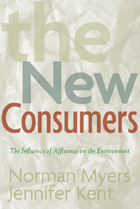
While overconsumption by the developed world's roughly one billion inhabitants is an abiding problem, another one billion increasingly affluent "new consumers" in developing countries will place additional strains on the earth's resources, argue authors Norman Myers and Jennifer Kent in this important new book.
The New Consumers examines the environmental impacts of this increased consumption, with particular focus on two commodities -- cars and meat -- that stand to have the most far-reaching effects. It analyzes consumption patterns in a number of different countries, with special emphasis on China and India (whose surging economies, as well as their large populations, are likely to account for exceptional growth in humanity's ecological footprint), and surveys big-picture issues such as the globalization of economies, consumer goods, and lifestyles. Ultimately, according to the orman Myers and Jennifer Kent, the challenge will be for all of humanity to transition to sustainable levels of consumption, for it is unrealistic to expect "new" consumers not to aspire to be like the "old" ones.
Cogent in its analysis, The New Consumers issues a timely warning of a major and developing environmental trend, and suggests valuable strategies for ameliorating its effects.
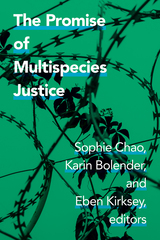
Contributors. Karin Bolender, Sophie Chao, M. L. Clark, Radhika Govindrajan, Zsuzsanna Dominika Ihar, Noriko Ishiyama, Eben Kirksey, Elizabeth Lara, Jia Hui Lee, Kristina Lyons, Michael Marder, Alyssa Paredes, Craig Santos Perez, Kim TallBear
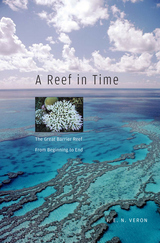
Like many coral specialists fifteen years ago, J. E. N. Veron thought Australia's Great Barrier Reef was impervious to climate change. "Owned by a prosperous country and accorded the protection it deserves, it would surely not go the way of the Amazon rain forest or the parklands of Africa, but would endure forever. That is what I thought once, but I think it no longer." This book is Veron's Silent Spring for the world's coral reefs.
Veron presents the geological history of the reef, the biology of coral reef ecosystems, and a primer on what we know about climate change. He concludes that the Great Barrier Reef and, indeed, most coral reefs will be dead from mass bleaching and irreversible acidification within the coming century unless greenhouse gas emissions are curbed. If we don't have the political will to confront the plight of the world's reefs, he argues, current processes already in motion will become unstoppable, bringing on a mass extinction the world has not seen for 65 million years.
Our species has cracked its own genetic code and sent representatives of its kind to the moon--we can certainly save the world's reefs if we want to. But to achieve this goal, we must devote scientific expertise and political muscle to the development of green technologies that will dramatically reduce greenhouse emissions and reverse acidification of the oceans.
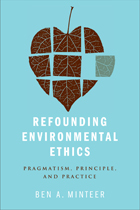
Providing a bold and original rethinking of environmental ethics, Ben Minteer's Refounding Environmental Ethics will help ethicists and their allies resolve critical debates in environmental policy and conservation practice.
Minteer considers the implications of John Dewey's pragmatist philosophy for environmental ethics, politics, and practice. He provides a new and compelling intellectual foundation for the field—one that supports a more activist, collaborative and problem-solving philosophical enterprise.
Combining environmental ethics, democratic theory, philosophical pragmatism, and the environmental social sciences, Minteer makes the case for a more experimental, interdisciplinary, and democratic style of environmental ethics—one that stands as an alternative to the field's historically dominant “nature-centered” outlook.
Minteer also provides examples of his pragmatic approach in action, considering a wide range of application and issues, including invasive species, ecological research, biodiversity loss, protected area management, and conservation under global climate change.
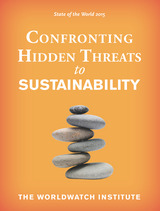
In State of the World 2015, the flagship publication of The Worldwatch Institute, experts explore hidden threats to sustainability and how to address them. How will nations deal with migration as climate change refugees cross borders in order to escape flooding, drought, or other extreme weather events? What will happen to the price and availability of fossil energy—the foundation of industrial civilization--as these resources oscillate between surplus and scarcity? If perpetual economic growth on a finite planet is impossible, what are the alternatives? Can national governments manage the transition? Eight key issues are addressed in depth, along with the central question of how we can develop resilience to these and other shocks.
For decades, The Worldwatch Institute has been a leader in identifying and analyzing emerging environmental threats. With the latest edition of State of The World, the authorities at Worldwatch bring to light challenges we can no longer afford to ignore.
READERS
Browse our collection.
PUBLISHERS
See BiblioVault's publisher services.
STUDENT SERVICES
Files for college accessibility offices.
UChicago Accessibility Resources
home | accessibility | search | about | contact us
BiblioVault ® 2001 - 2024
The University of Chicago Press









